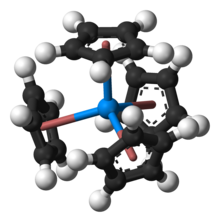Tetrakis(cyclopentadienyl)uranium(IV), U(C5H5)4, abbreviated U(Cp)4, is an organouranium compound composed of a uranium atom sandwiched between four cyclopentadienide rings.

| |
| Names | |
|---|---|
| IUPAC name
Tetrakis(η5-cyclopentadienyl)uranium(IV)
| |
| Other names
Tetracyclopentadienyluranium
U(Cp)4 | |
| Identifiers | |
3D model (JSmol)
|
|
| ChemSpider | |
PubChem CID
|
|
| |
| |
| Properties | |
| C20H20U | |
| Appearance | red crystals |
Except where otherwise noted, data are given for materials in their standard state (at 25 °C [77 °F], 100 kPa).
| |
Synthesis and properties
editTetrakis(cyclopentadienyl)uranium(IV) was first prepared in 1962 by Ernst Otto Fischer, who reacted uranium tetrachloride with excess potassium cyclopentadienide in benzene and obtained the complex as red crystals at 6% yield:[1][2]
- UCl4 + 4 KCp → U(Cp)4 + 4 KCl
Solid crystals of U(Cp)4 are air-stable, but the benzene solution is extremely air-sensitive.
Reduction of U(Cp)4 with uranium metal yields tris(cyclopentadienyl)uranium(III), U(Cp)3.[1]
References
edit- ^ a b Seyferth, Dietmar (2004-07-01). "Uranocene. The First Member of a New Class of Organometallic Derivatives of the f Elements". Organometallics. 23 (15): 3562–3583. doi:10.1021/om0400705. ISSN 0276-7333.
- ^ Fischer, Ernst Otto; Hristidu, Yani (1962-04-01). "Notizen: Über Aromatenkomplexe von Metallen LVII. Uran-tetracyclopentadienyl". Zeitschrift für Naturforschung B. 17 (4): 275–276. doi:10.1515/znb-1962-0410. ISSN 1865-7117. S2CID 105017911.
Wikimedia Commons has media related to Tetrakis(cyclopentadienyl)uranium(IV).